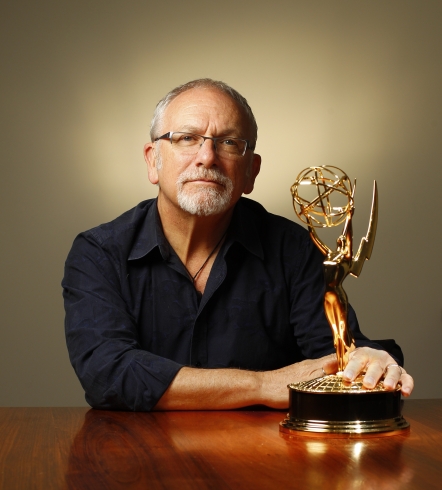“GO on, pick it up,” Tony Wright says invitingly, glancing at the statuette of a winged woman on his dining room table.
“I’ve heard it weighs the same as an Oscar,” says Wright.
It’s not every day one gets the opportunity to feel the weight of an Emmy, so, of course, I grab at the chance. She is lighter than I expected.
After trumping Morgan Freeman with his documentary film, Decoding Immortality, the Williamstown producer looks content in the backyard of his suburban oasis.
Wright lives by the bay with his primary school teacher wife Bernadette and their sons, Olly, 20, and Ed, 18. He’s surrounded by cats Hamlet (Hammie) and Nala, and over-friendly dalmation Lottie.
Wright’s film about the scientific discovery of an enzyme that fuels life — and cancer — won an Emmy award for outstanding science and technology programming. It is thought to be only the second Australian documentary to win US television’s most prestigious award.
The enzyme discovery by Australian-born Professor Elizabeth Blackburn earned her the 2009 Nobel prize in medicine.
Immortal was originally a bookend: one of a pair of documentaries offered to the ABC.
“Unfortunately, they only wanted Catching Cancer, so we offered Immortal to SBS,” Wright says.
Undoubtedly, a decision the ABC lived to regret. “I’m sure they got over it,” Wright laughs.
Does he find it ironic that the key to longevity houses the cause of cancer?
“Totally, totally. But that is not a surprise to me because everything has two sides.
“You know, Dorian Gray . . . something had to give.
“The picture in the attic ages while he maintains his youth.
“There is a price. There’s a ying and yang. At the heart of a key to longer life is also something that is the key to cancer’s survival.
“I love that rich irony and when you can flip it a bit further, if we as human beings are able to extend our lives further and further, we overpopulate and we become a cancer on the face of the earth. Cells are supposed to die. We are supposed to die.
“If we find ways of living longer we will consume more of the earth, very much like cancers consume us. To live to 100, 120, is well beyond the lifespan that I think is probably healthy for the earth.”
The London-born Wright doesn’t look his 61 years.
As his film explains, life can be lengthened or shortened depending on the level of happiness or stress we experience.
After arriving in Australia at 28, Wright was a moderately late starter in television at 31.
He lived in Murwillumbah in northern NSW for six months but “got sick of the hippies”.
Then he lived in Northcote and Fitzroy for about 20 years before moving to Williamstown 12 years ago.
For a while, he worked as an extra, a runner, camera assistant, assistant director, and in the art and production departments.
Wright’s elder son Olly Tripodi refers to this period in his father’s life as his halcyon days when he placed more of a premium on socialising.
But Tripodi says his father also taught him the value of hard work.
“He’s somebody who kind of only fell into film and television when he was probably in his mid-30s. It just kind of goes to show that through dedication and resilience and passion you can actually make something of yourself.
“I won’t go into intimate details, but Tony’s 20s are not going to be like my 20s, you know. Crazy, some of the stories you hear.
“I suppose he’s turned it around because he was off the rails but he suddenly altered his outlook on life and it’s pretty incredible.
“He moved to Australia in the mid-70s, so he would have been 25, and didn’t really embark on any sort of career until he was 30, so he kind of had a whole heap of odd jobs and lived more hedonistically — I mean certainly not in a negative way, but work wasn’t a big part of his life.
“He had a string of share houses. It was probably more economical-style living.
“He certainly kind of put more of a premium on socialising than anything else, which makes the turnaround so interesting.
“I don’t mean it’s a turnaround as in he was off the rails, like a drug addict. Nothing like that. He enjoyed life and he still does, but it’s been a real shift in focus.
“Like he’s gone, ‘This is something I love, this is something I’m good at’, and he went bang, straight for it. He deserves some recognition.”
Eventually, Wright established a company producing mainly educational training films before moving onto subjects like the rebirth of habitat following Victoria’s Black Saturday bushfires.
“We’re just delivering a 10-part drama series for the ABC, a murder mystery series called the Doctor Blake Mysteries.”
Set in Ballarat in 1959, it goes to air in February with Craig McLachlan as Dr Blake.
“We’ve also just done a five-part drama series for Channel Seven, which is called Mrs Biggs, which is the story of Charmian Biggs, the wife of the Great Train Robber Ronnie Biggs.”
I’ve often wondered about Ted Bundy’s daughter or Peter Dupas’s wife, I muse out loud.
“It’s a very interesting idea and I’m gonna pinch that,” Wright says enthusiastically.
“You often do wonder about the partner of a criminal who is kind of compelling and engaging like Ronnie Biggs,” he says.
“To access a story about Peter Dupas’s wife? Whooh, dunno that I’d want to spend my time going there.”
He beams when discussing Mrs Biggs, by UK writer Jeff Pope who was also the executive producer of Appropriate Adult, the Fred West story. “I really take my hat off to him because it is such a great way to tell that story. We get the story but what we get is something much more.
“We get the poignancy, we get the arc of a woman, an impressionable young 18-year-old meeting a 28-year-old Ronnie Biggs — ironically on a train.
“Coming from quite a dysfunctional family, falling unto his spell.
“It leads to these things where she has to save her children from ruin and gives up her husband.
“She loves him but says, ‘To love you, I have to let you go’.”
Wright says stories like Underbelly are just accounts, and accounts just aren’t enough.
“I think we have to find where the personal story and resonance is.
“I think we can do a lot better.
“Everyone knows the facts, and who cares about a bunch of criminals at a certain point?”
But with immortality, “a deeply fascinating subject”, Wright has produced his most awarded film — receiving more than 20 accolades so far.
So how does he feel about living longer?
“I think I like the idea of living to a reasonable age and not having the diseases of ageing,” Wright says.
“My work keeps me young. It actually keeps me completely exhausted.
“This year’s been an enormous year.”








